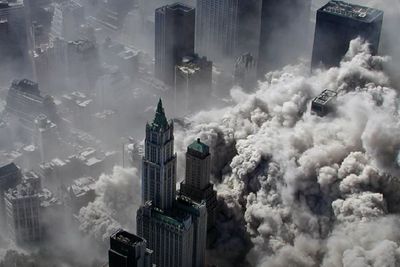Should There Be Movies About 9/11?
Can fictionalized movies about 9/11 ever be good entertainment, or just exploitation?
For Americans, 9/11 was more than just a horrendous terrorist attack.
9/11 changed the very fabric of American culture. Even for people who didn't lose anyone close to them in the tragedy, life seemed to shift post-9/11. Many realized that their world was much darker and much less safe than they had once imagined. Fear of outsiders seeped into public consciousness. Some of it was warranted, but a lot of it was not. Opposing parties briefly united under the banner of American pride and then separated almost as quickly in disputes over how to best move forward.
So, naturally, 9/11 is an incredibly relevant topic in discussions of American culture and media. It's weird to think that many kids growing up now have no real knowledge of the attacks themselves or what America was like before them. HBO's documentary, What Happened on September 11, which aired on the 18th anniversary of the attacks, aims to fix that by educating kids about the subject in a way they can readily understand.
Documentaries like this are necessary to preserve and teach about history. But what about fictionalized movies that use 9/11 as a source of entertainment? Are those movies positive, too, or just exploitative?
One of the biggest issues with movies based on real-life tragedies is how pandering many of them seem. In most cases, these "real life terrorist attack" movies capitalize on specific instances of human suffering to turn a quick buck from a niche audience who is riled up on a cocktail of patriotism and jingoism but also most likely have no real connection to the tragedy (otherwise, a dramatization would probably be too upsetting). In other words, movies based on real terrorist attacks rarely exist to further any discussion or memorialize the victims––they exist to profit off tragedy, using the suffering of others as a form of entertainment.
But there are a lot of 9/11 movies––a lot––and it would be unfair to lump all of them in the same profit-mongering boat. Some are certainly better than others, but for discussion's sake, let's take a look at two examples: Remember Me and United 93.
Remember Me is definitely one of the worst 9/11 movies (and possibly one of the worst movies ever made). It's a romantic drama starring Robert Pattinson and functions as a pretty standard drama until the end, wherein Robert Pattinson dies in 9/11. It's absolute garbage and essentially turns one of the most tragic events in modern history into an M. Night Shyamalan-type twist.
The biggest problem with Remember Me, though, is that there is no reason for the movie to involve 9/11. It could have used literally any generic "random" tragedy and gotten the exact same result within the context of its narrative. "Life is fleeting, you never know when bad things can happen, yadda, yadda, yadda." Instead, it risks opening relatively recent wounds (the movie came out in 2010) for people who actually lost loved ones in an attack and, presumably, wouldn't have knowingly signed up to watch a 9/11 movie in the first place.
United 93, on the other hand, is probably the closest a 9/11 movie has ever come to being a good film. The drama-thriller depicts the titular flight which was hijacked by terrorists but crashed in a field after passengers fought back. The movie is genuinely very nerve-wracking, presented mostly in real time, forcing the audience to question how they would react in a similarly fraught situation.
With that being said, the movie is still rife with the warts of its genre. It was allegedly made with cooperation from all of the passengers' families, but this was later disputed by one of the passenger's widows. That passenger, Christian Adams, received a contentious portrayal in the film, depicted as trying to appease the terrorists despite there being zero evidence that he did anything of the sort. In spite of the filmmaker's best efforts, United 93 is still prone to Hollywood-esque dramatization that, in this instance, spit on the memory of an actual victim. It's hard to say that making a tense thriller is worth it when it comes at the expense of a real, grieving person whose husband died in the attack.
So should there be movies about 9/11? More importantly, should there be movies about recent terrorist attacks in general? It depends. In the best case scenario, you make a technically "good" movie that's still morally dubious. Worst case scenario: You trigger the families of actual victims of a real-life recent terrorist attack. When it comes to "entertainment," there's a very thin line between drama and exploitation. Filmmakers need to understand that when they use real terrorist attacks as a springboard for their films, regardless of their intent, they risk reopening real wounds.
